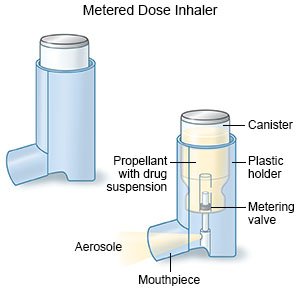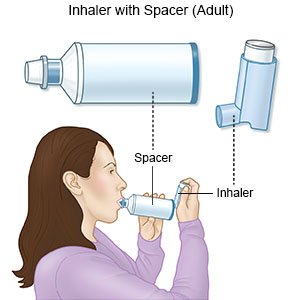How to Use A Metered-Dose Inhaler and a Spacer
Medically reviewed by Drugs.com. Last updated on Apr 6, 2025.
What is a metered-dose inhaler and a spacer?
A metered-dose inhaler is a handheld device that gives you a dose of medicine as a mist. You breathe the medicine deep into your lungs to open your airways. A spacer is a tube that attaches to the mouthpiece of your inhaler. The spacer helps make your inhaler easier to use. It also helps get the medicine into your lungs better.
 |
How do I use my inhaler with a spacer?
Follow the instructions that come with your inhaler and spacer. Your medicine will work best if you use them correctly. The following steps will help you use your inhaler and spacer correctly:
- Remove the cap. Check to make sure nothing is in the mouthpiece that could block the medicine from coming out.
- Shake the inhaler to mix the medicine. Hold the inhaler upright. Prime the inhaler as directed.
- Put the spacer onto the inhaler. If your spacer has valves, make sure they are not blocked.
- Breathe out fully. Do not breathe out into the spacer mouthpiece.
- Place the spacer mouthpiece between your lips. Close your lips tightly around the mouthpiece to form a seal and prevent a medicine leak.
- Breathe in slowly through your mouth as you press down on the canister. Breathe in for 5 seconds.
- Hold your breath for at least 5 seconds. This helps the medicine get deep into your lungs.
- Remove the mouthpiece from your mouth. Breathe out slowly.
- Repeat puffs of medicine as directed by your healthcare provider. Wait 1 minute between puffs.
- Rinse your mouth with water or saline. Do not swallow the water or saline.
 |
How do I care for my inhaler and spacer?
Pull your inhaler and spacer apart. Put the caps back on both after each use. Clean your spacer and inhaler at least 1 time each week, or as directed. Follow the cleaning instructions that come with your inhaler and spacer.
Drugs used to treat this and similar conditions
Paracetamol
Paracetamol (Panadol, Calpol, Alvedon) is a widely used over-the-counter painkiller and fever ...
Zyrtec
Zyrtec (cetirizine) is used to treat allergy symptoms such as sneezing, itching, watery eyes, or ...
Ozempic
Learn about Ozempic (semaglutide) for type 2 diabetes treatment, weight management, cardiovascular ...
Flonase
Flonase (fluticasone nasal) is used to treat nasal congestion, sneezing, and runny nose caused by ...
Azithromycin Dose Pack
Azithromycin Dose Pack is used for babesiosis, bacterial endocarditis prevention, bacterial ...
Tylenol
Tylenol is a pain reliever and a fever reducer used to treat many conditions such as headaches ...
Loratadine
Loratadine is a non-drowsy antihistamine used to relieve allergy symptoms like sneezing, runny ...
Amoxicillin
Amoxicillin is a penicillin antibiotic that fights bacteria. It is used to treat many types of ...
Prednisone
Prednisone is used to treat allergic disorders, ulcerative colitis, psoriasis and arthritis. Learn ...
Fluticasone nasal
Fluticasone nasal is used for allergic rhinitis, allergies, chronic rhinosinusitis with nasal ...
Call your local emergency number (911 in the US), or have someone call if:
- Your lips or nails turn blue or gray.
When should I seek immediate care?
- You cough up blood.
- The skin between your ribs or around your neck pulls in with every breath.
- You feel short of breath, even after you use your inhaler.
When should I call my doctor?
- You have to take more puffs from the inhaler than directed, in order to get relief.
- You run out of medicine before your next refill is due.
- You feel like your medicine is not making your symptoms better.
- You have questions or concerns about your condition or care.
Care Agreement
You have the right to help plan your care. Learn about your health condition and how it may be treated. Discuss treatment options with your healthcare providers to decide what care you want to receive. You always have the right to refuse treatment. The above information is an educational aid only. It is not intended as medical advice for individual conditions or treatments. Talk to your doctor, nurse or pharmacist before following any medical regimen to see if it is safe and effective for you.© Copyright Merative 2025 Information is for End User's use only and may not be sold, redistributed or otherwise used for commercial purposes.
Further information
Always consult your healthcare provider to ensure the information displayed on this page applies to your personal circumstances.
